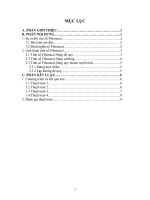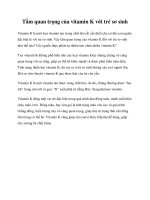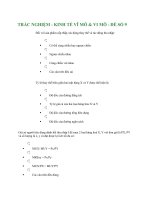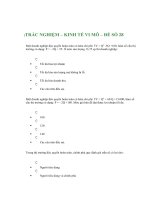Skull Drawing: Not So Scary! potx
Bạn đang xem bản rút gọn của tài liệu. Xem và tải ngay bản đầy đủ của tài liệu tại đây (150.8 KB, 7 trang )
Skull Drawing: Not So Scary!
Skull drawings are a part of classic tattoo designs. They appear in almost all tattoo
art and styles, including Hindu and Buddhist. Skulls are also a pretty significant
part of religious art as well.
There are many ways to interpret the skull.
Shape
The same tips for how to draw a face can be applied to creating skull drawings.
The proportions are obviously the same, as the skull is what gives the face its
underlying shape. The only difference is that there is no cartilage to be drawn on
the skull. It is strictly bone.
Skulls come in all shapes and sizes and can
be customized to how you like, once you know the basic shape and
proportions.
It may even be easier to draw a skull than a full head. Most guides and
instructions, including the ones on this site, use a circle to establish the size and
shape of the head, as this is the simplest and most effective method.
Same as Drawing the Face
Below you will see that the skull is drawn pretty much the same way as the face.
The roundness is even more apparent when drawing the skull, as there are no ears
or hair. It can be drawn using the same proportions as the face. The brow line,
mouth, and chin will all be in the same locations.
The only difference is that you will draw everything that you see along with more
structural parts of the face.
Having a little knowledge of the skull helps, but if you have a face, you pretty
much know how it is shaped. If you are reading this, you have also probably seen
a thousand skulls as well.
You already know what the skull looks like. The key with drawing one is to
make it your own. Developing your own style helps with this.
Tip: Style is achieved by doing anything consistently. Keep drawing skulls until
you find a "look" that you like. That really is the key to finding your own style.
Keep drawing more and more things until a "look" emerges. It's pretty much the
same way with personal style. The older someone is, usually the more refined
style they have. Why? They have been doing it longer and have perfected their
"look."
I digress. Back to skull drawings. The point is that the artist's interpretation is what
makes it great.
Tip: Drawing the cheekbones in will really start to make your skull drawing look
like a skull. You can exaggerate the size of them to create more interesting
drawings and creatures. This also applies to the eyes.
Step By Step
A very simple way to start with drawing a skull that I learned a long time ago is to
start with the nose. This is the first skull drawing I learned to draw. It is a very
simple and classic skull drawing.
While this version is not very realistic and doesn't follow the drawing portraits
approach, it is a pretty easy version to get started with. Once you get some basics
down, you can start to customize them and vary the proportions how you like,
creating more realistic versions.
Nose
First start by drawing an "A" shape for the nose. Fill in the center of the "A" and
then you have a very basic nose shape. It is also like an upside down heart shape.
Eyes
The eyes will be round circles. To give them a little more shape, angle the inner
part of the eyes. This will suggest the cheeks.
Cheeks
The cheeks will be the most revealing part of this skull drawing, giving the
drawing its main shape and really making it look like a skull. Draw a sharp curved
line from the top of each eye to just under it, almost like a really curvy "J." This is
the cheekbone leading to the teeth.
The Cranium
Now that you have the main part of the face, you can draw the top of the head.
Starting with an angular line from the top of the cheekbone, draw the round part of
the head and connect it to the other side of the head. You can shape the head
however you like with just a small adjustment to the angles and pitch of the top of
the head.
Teeth & Jaw
The last part is the teeth and jaw. The top part of the drawing can be simplified
into one shape. The jaw is the movable part. It will start under the cheekbone.
Draw a curved line from each cheekbone. This will create the chin. You can then
fill in the teeth. You can draw them individually or as all one image with lines to
suggest them. There is a slight gap in between them.
In Closing
Skull drawings, like any other images, are best with a personal touch. You can
exaggerate what elements you like, but the overall structure of the skull will
remain. As always: KEEP IT SIMPLE!
For even more inspiration for your skull images, check out Tattoo Johnny. They
have one of the largest collections to browse through on the Net. Having a good
idea of what's out there can significantly influence your own work and take it to
even greater heights!









